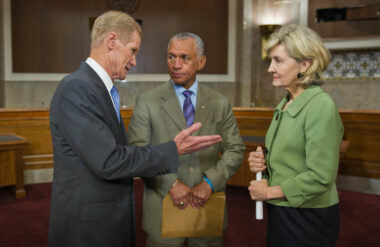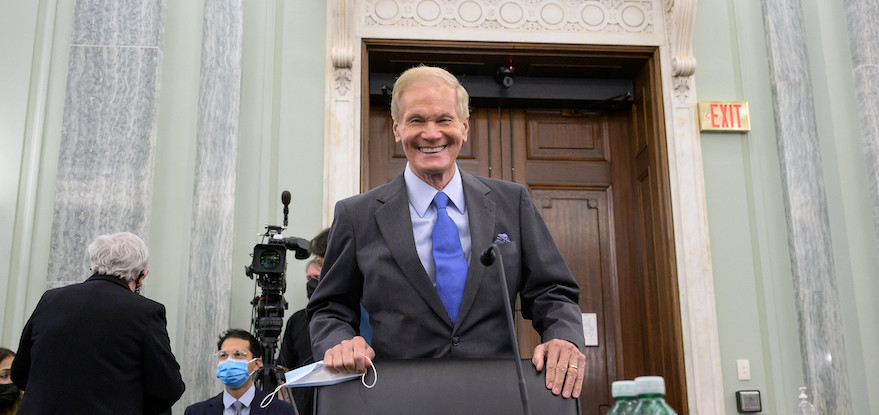Products You May Like
Nelson’s age and experience are an asset, not a liability, when it comes to leading NASA through the budget battles ahead
When looking to strategically position the United States. as the dominant force in space for the 21st century, it made perfect sense to select a nominee to lead NASA who literally served our nation in space. Former Sen. Bill Nelson, who flew on the space shuttle in 1986 while a member of the House of Representatives, is a pragmatic yet inspired selection. He intimately knows the agency, its mission, its workforce, and its reputation in Congress. So why is there pushback rather than praise?
Presidential nominees anticipate intense scrutiny of their public record – from financial dealings and voting history to past speeches and tweets. Opposition inevitably comes with the honor of being nominated. With Sen. Nelson’s selection, however, President Biden hit the ball out of the atmosphere, so to speak.
Thus, I was surprised to see criticism come not from Republican members of Congress who roundly lauded the choice, but from within specific sectors of the space community. A closer examination of who is leveling the attacks and on what basis surprised me and others now working in the commercial space industry.
Do these same critics argue that President Biden — who, like Nelson, was born in 1942 and came of age during the first Space Race — is unable to lead the country in today’s generational issues of climate change, cybersecurity or artificial intelligence?
Criticism of Sen. Nelson’s nomination — most vocally from past NASA appointees of the Obama administration — degrades Biden’s pick as a relic of a time long passed and space goals already accomplished. They implicitly suggest that Nelson is too old for this mission, implying a candidate who entered Florida politics during the 1970s era of the human spaceflight program cannot successfully advance 21st century space priorities. And they explicitly argue that gender and race should be weighted when evaluating qualifications of NASA nominees.
In truth, Sen. Nelson has done more to advance NASA’s founding mission, protect and expand its budget, and promote its image to inspire future generations than most space-related policies proposed, or political appointments made, during the Obama administration. His record is long, distinguished and indisputable: a steady hand presiding over the Congressional response to the 2003 Columbia accident and shuttle’s subsequent 2005 return to flight; a champion of countless budget battles to support exploratory missions and staff; and a fierce protector of NASA’s future by securing the Space Launch System (SLS) rocket. He has been at the forefront of the nation’s space conversation since the late 1970s – a steadfast proponent to ensuring assets and capabilities are not irreplaceably lost. As we increasingly engage a familiar adversary, Russia, and an ambitious new entrant in China on the next great space race, Sen. Nelson can secure success for the United States.

The argument that nostalgia for past space systems and NASA projects will cloud the nominee’s judgement about advancements achievable now are pulled out of thin air. Do these same critics argue that President Biden — who, like Nelson, was born in 1942 and came of age during the first Space Race — is unable to lead the country in today’s generational issues of climate change, cybersecurity or artificial intelligence? Youth and imagination do not supersede experience and accomplishment.
Furthermore — and a key fact his detractors often ignore — Sen. Nelson has the trust, confidence, and long personal relationship with not only President Biden, but of his former congressional colleagues who are paying closer attention to critical space issues affecting Earth and beyond. These pivotal relationships can advance or stall NASA’s evolving priorities.
In addition to the congenial style and substantive knowledge of the nominee, the strength of this nomination will be most evident come appropriations time on Capitol Hill. Often the messenger matters as much as the message, and Sen. Nelson not only speaks the language but wrote the playbook as the longtime chairman of the Senate Commerce Committee that authorizes NASA’s budget. The Biden administration’s priorities in space such as advancing innovative technologies, commercial space travel, sustainable missions, and climate research would be better positioned for scarce federal resources if the proverbial “go-to” senator for space matters was now administrator. Democrats and, more importantly, Senate Republicans will likely be more receptive to NASA’s new initiatives, as they telegraphed during the confirmation hearing and subsequent unanimous committee vote.
From my purview on a congressional oversight committee, previous administrations either did not prioritize space beyond the national security mission or lacked the political gravitas to navigate Congress and truly unlock the power of the purse for NASA research projects. The stars are aligning for the Biden administration to break that tradition.
While outside critics may be focused on Sen. Nelson’s past, policymakers are rightly focused on NASA’s future. The past few years alone have significantly advanced our knowledge of the galaxy for which we live, from uncovering Pluto’s mysteries to the Perseverance rover sending digital postcards from the surface of Mars. Moving forward with the commercial space industry as an eager and willing partner, NASA will further explore new horizons while playing a vital role in the pressing issues affecting our planet. Who better to lead the agency whose vision statement is “We reach for new heights and reveal the unknown for the benefit of humankind” than the individual who succeeded in space on behalf of the United States once before.
Former U.S. Rep. Frank LoBiondo (R-N.J.) served six years as chairman of the House Transportation aviation subcommittee which shares congressional oversight of commercial space travel. He served 12 terms before retiring in January 2019. He is CEO of LoBo Strategies LLC and currently an adviser to United Launch Alliance.
